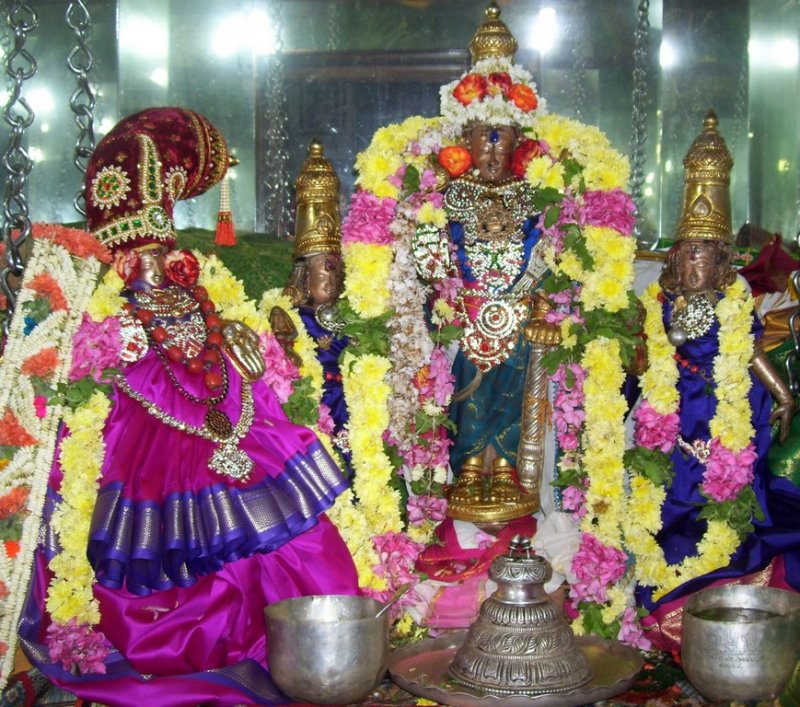Published from “Three Minutes” series written by A.S.Rajagopalan Swami of Ohio.
 engum pOi karai kANAdu eri
engum pOi karai kANAdu eri
kaDal vAi mInDEyum
vangattin kUmbERum
mAppaRavai pOnREnE
(Kulasekhara AzhvAr, PerumAL tirumozhi
5-5)
pOnREnE = (I am) like that
mAppaRavai = huge bird (which)
engum pOi = wandered everywhere
(but)
karai kANadu = could not find the shore
eri kaDal vAi = (of that) high sea
mINDEyum = (so) once again (returned
back to)
ERum = climb
kUmbu = the main mast
vangattin = of the ship
Kulashekara AzhvAr, a king from Kerala, longed for the spiritual union with the Lord and transformed himself to be a royal saint. He and PeriyAzhvAr (ViShNucittar) are the only two who offered a garland of verses (pAmAlai) and their daughters to wed Lord shrIman nArAyaNa. King Kulashekara composed PerumAL tirumozhi in tamizh and mukundamAlA in saMskR^it. He has done mangaLAshAsanam (sing in praise of local deities) of only a few places. In this padikam (decad of 10 verses), he laments about his helplessness and makes a total surrender to uyyavanda PerumAL (Lord who came to enrich) of tiruvittuvakkODu, depicted through amazing similes. He is making sharaNAgati with such a meek tone and says even if the Lord disowned him, he will never leave Him simply because He is the only savior.
In this particular verse, AzhvAr compares him to a bird lost in the high seas. A bird that wanted to cross the ocean to reach the shore on the other side, initially was smart enough to climb the main mast of the ship and stay on it. But, in the middle of the journey, it thought that the destination was nearby and trusted its instincts to find the place, abandoning the ship and flew away. After many attempts to reach the destination, it realized that it could not do it alone. Thus, it humbly returned back to the old place, the main mast of the ship.
The inner meaning (svApadesham) here relates to Prapatti, the total unconditional surrender to the Lord. Here is the comparison:
1. Huge Bird = ego filled individual souls [cetana-s]
2. High sea = samsAra sAgaram (bondage of birth/death cycle ocean) [samsAra]
3. Ship = BhagavAn shrIman nArAyaNa ( Ishvara)
4. Main mast = AcArya identified through his tridanDam (AcArya)
5. Shore = mokSham and other incidental earthly rewards [mokSham]
6. Bird’s search in locations = expecting help from others [anyagati]
7. Bird’s own attempts = ego-centric karma, j~nAna, bhakti yogas [ anyaupAyam]
8. Returning = Renouncing other means [ ananya gati, ananya sharaNam ]
9. Sit back = be humble and realize utter helplessness [kArpaNyam]
10. and wait = Perform Prapatti and enjoy the rest of life [mahA vishvAsam]
The Sea and Ship have been common analogies used in scripts. Individual souls are like birds entrapped in samsAra that are wandering clueless everywhere in search of a fortune, dharma, artha, kAma, mokSham (Righteousness, Wealth, Worldly pleasures, eternal bliss). After the failure of their valiant attempts, they recognize that they are getting weaker and weaker, the shore is nowhere in sight, and also realize that they are totally lost on their current position. svAmi deshikan also writes “iLaittu vizhum kAgam pOl” (Raven which is so exhaustively tired and gives up) makes an example of a bird to get the same idea across. Finally, deserting their own attempts, they return to the Lord, make a complete surrender to Him, and keep an unshakable faith that He will take them to the destination. In reality, this method is a lot safer and surer too. The main mast provides nice perch for the bird to sit on and also helps to identify the ship from a distance. Similarly AcArya (guru or teacher) and his tridaNDam (three sticks tied together with a flag at the top) help the individual soul to identify and access the Lord. The shadow of AcArya also provides a great place to spend the rest of the life, peacefully and happily.
The eligibility for Prapatti hinges on two important criteria: Realizing the utter inability (Aki~ncanyam) and renouncing other demi-gods, route or paltry rewards (ananyagatitvam). Only shrIman nArAyaNa can grant you the mokSham, so why bother with others? (shrI mahAlakShmI and AcArya-s are recommenders and you need them). You want the fastest and cheapest method, don’t you? It is almost impossible for other routes like karma, j~nAana and bhakti yoga to fetch the result faster. Don’t get tricked by paltry rewards; you want the ultimate one. Hold on to the Lord’s feet humbly, pray to him in a sorrowful note, and request Him to grant the mokSham (the ultimate bliss) which lies on the other side of he VirajA River. Have an immense faith that He is only the means and ends. Never look for any backup or alternates. Even if Lord shrIman ArAyaNa deserts us, we don’t have any choice but go back to Him – thatis what Kulashekhara AzhvAr emphasizes here.
What we learn here –
1. Prapatti is THE only means guaranteed and the shortest path to mokSham.
2. All it requires is for you to give up other means. What you have to do is very little.
3. AcArya is the only intermediary through the prapatti process can be accomplished.
4. After prapatti, have peace and enjoy; lead life adhering to the scripts.
Heaven gives its glimpses only to those Not in position to look too close
[Heaven = mokSham, too close = self-ego]









